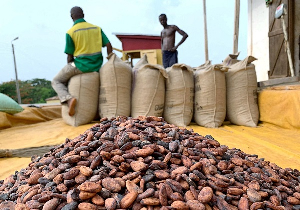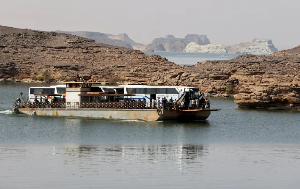Accra — As part of managing people's expectations ahead of the first flow of oil from the Jubilee Field in the last quarter of this year, some players in the oil and gas industry of Ghana have called for a single-source standardized estimation of expected revenue from the oil.
The call comes in the wake of various estimates of expected oil revenue from phase one of the Jubilee Field project being thrown about in the public domain by different sources. At least, four separate estimates are making the rounds. These are from the World Bank (WB), the International Monetary Fund (IMF), the German Development Corporation (GTZ) and the Ghana National Petroleum Corporation.
The Bretton Woods institutions anticipate an annual average revenue of about US$1 billion. The GNPC on its part forecasts annual oil revenue to be between US$836 million and US$1.6 billion while the GTZ estimates potential annual oil revenue to be between US$200 million and US$1 billion.
These, according to some individuals, are rather confusing Ghanaians and heightening their expectations unnecessarily. They prefer a one-source clear-cut estimates and in addition, an explanation to Ghanaians that the estimated figures are based on "guesswork" and not actual production.
The concerns were raised last Wednesday in Accra when the Kumasi Institute of Technology and Environment (KITE) launched two educational materials on the oil and gas industry. The materials are "An Oil and Gas Stakeholder Guide" and "A Glossary of Selected Oil and Gas Terminologies".
The IMF estimates are based on the following assumptions: that total reserves are 500 million barrels; that there is initial production capacity of 60,000 barrels per day (bpd) rising to 120,000 bpd; that field development cost would be US$2-3 million; that there would be an annual production cost of US$200 million; that oil prices would follow the IMF's World Economic Outlook projections minus a 10% prudential discount through 2014, and assumed to remain constant thereafter.
According to the IMF, estimated revenue from the Jubilee Field will be US$752 million in 2011. The highest revenue of US$1.55 billion is expected in 2019. By 2029, expected revenue will decline to US$247 million.
On the other hand, the WB assumes that there are 500 million barrels of recoverable reserves; that there is output capacity of 120,000 bpd; an oil price of $75 per barrel; that there would be an output at peak capacity for five years followed by 14 years declining output; and a capital cost of US$4 billion. The Bank estimates US$900 million revenue in 2011 rinsing to a peak figure of US$1.8 billion in 2016 and later declining to US$492 million by 2029.
The GTZ's estimated revenue of between US$200 million and US$1 billion is based on a daily oil production rate of 40,000 and 150,000 and a crude oil price of US$50 per barrel of oil.
Meanwhile, the only local estimates come from the GNPC. The Corporation's prediction of between US$836 million and US$1.6 billion assumes a daily production rate of 100,000 bpd and crude oil price of US$60 per barrel in the lower case scenario and production rate of 200,000 bpd in the higher case scenario.
The above estimates, contained in the KITE booklet, were enough to evoke some passionate discussions including the fact that Ghanaians do not know whom to believe as far as estimated revenue was concerned. Some called on government to declare one source as the one to believe. Ironically, many government officials have been quoting estimates by the WB and IMF in their deliberations regarding the industry.
Wednesday's launching was part of KITE's G-RAP-funded Oil and Gas Sector Research and Advocacy Project (OGSRAP), which seeks, among other things, to work with the Ghanaian legislature and other stakeholders such as the media and other civil society organisations to promote the institutionalization and practice of the good governance principles in Ghana's emerging oil and gas industry.
According to KITE, the guide, entitled "Ghana's Emerging Petroleum Industry: What Stakeholders Need to Know", has been prepared on behalf of the Oil and Gas Stakeholders Network (OGSN) to provide simple and easy to understand information on the emerging oil and gas industry in Ghana, especially on how the industry is expected to impact on the general well-being of the citizenry and the overall Ghanaian economy. The glossary, on the other hand, is intended to serve as one-stop quick reference material for stakeholders who desire to understand and appreciate the meaning of jargons used by experts during discourses/discussions on oil and gas sector. It includes over 120 selected terminologies. Ishmael Edjekumhene, Director, KITE, described the publications as "humble beginnings to many great things to come." He said the main motivation was awareness and sensitization of the public and non-technical persons to manage their expectations.
The guide, according to him, gives the background of oil and gas as a resource, its ownership in Ghana; the quantity of stock; revenue sharing; revenue management by the Goverment of Ghana; impact on local communities; stakeholders and their roles; and the role of international oil marketing companies.
Edjekumhene said, "Everything that we've said in this publication is based on the proven reserves in the jubilee field. What we have done is to refrain from including our own opinions."
The management of estimated revenue and the impact of the oil and gas industry on local communities were of concern to Nana Kobina Nketsia V, Omanhene of Esikado Traditional Area in the Western Region. He cautioned in philosophical terms , "Oil is a very inflammable material; it can either set fire to this country to destroy or it can either set fire to this country to refine us".
Launching the publications, Nana Nketsia V said the documents will aid understanding of the oil and gas sector.
Lawrencia Adams, Head of Project Management Team, Ghana Research and Advocacy Programme (G-RAP) noted that the publications would help the discussion of important and real issues in the oil and gas industry.
She said these discussions were pertinent because as September approaches, it is clear that several of the regulatory frameworks that Ghana needs to ensure that it gets a better deal than some of its neighbours in Africa have not been concluded.
About a fortnight ago, civil society groups in the oil and gas industry faulted consultations on the Draft Ghana Petroleum Revenue Management Bill, describing it as "speculative without any strong foundation."
According to the groups, Government so far has been economical with the release of relevant information on the proposals for petroleum revenue management thereby compromising the quality of the consultations.
They believed the window-dressing approach to the consultations were to satisfy the World Bank in order to secure the release of the second tranche of the $300 million facility secured from the Bank in January 2009.
General News of Monday, 29 March 2010
Source: Public Agenda
Confusion Over Oil Revenue Estimates
Entertainment

Chez Amis CEO addresses NACOC arrest allegations
Opinions









